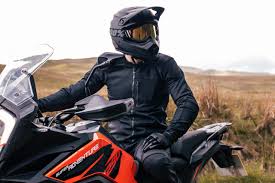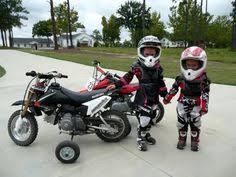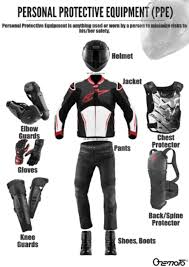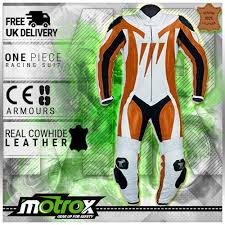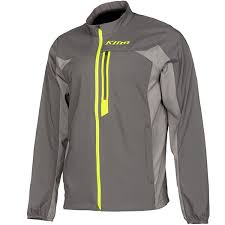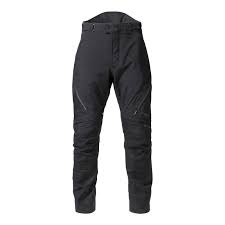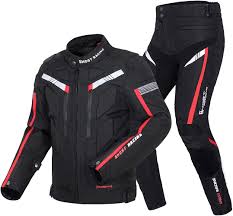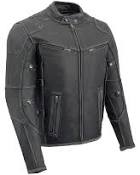Essential Motorbike Gear: Your Guide to Safe and Stylish Riding
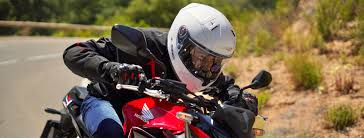
The Essential Guide to Motorbike Gear
When it comes to riding a motorcycle, safety should always be a top priority. One of the most important aspects of motorcycle safety is wearing the right gear. Proper motorbike gear not only protects you in case of an accident but also enhances your overall riding experience.
Helmet
Arguably the most crucial piece of motorbike gear is the helmet. A good quality helmet can save your life in the event of a crash. Make sure your helmet fits properly and meets safety standards.
Jacket
A durable motorcycle jacket not only provides protection from the elements but also offers abrasion resistance in case of a fall. Look for jackets with built-in armour for added protection.
Gloves
Protecting your hands is essential while riding. Invest in a pair of motorcycle gloves that offer grip, comfort, and impact protection.
Trousers
Motorcycle trousers are designed to provide protection for your lower body in case of a slide or fall. Look for trousers with reinforced padding and abrasion-resistant materials.
Boots
Proper footwear is crucial when riding a motorcycle. Motorcycle boots offer ankle support, impact protection, and slip resistance. Choose boots that are comfortable for long rides.
Visibility Gear
Enhancing your visibility on the road is key to staying safe while riding. Invest in reflective gear, such as vests or strips, to make yourself more visible to other road users.
Remember, wearing the right motorbike gear is not just about following regulations—it’s about protecting yourself and enjoying a safer riding experience. Invest in high-quality gear that fits well and provides adequate protection for all your rides.
Top 7 Benefits of Motorbike Gear for Safety, Comfort, and Style
- Enhances rider safety in case of accidents or falls
- Provides protection from the elements while riding
- Improves overall comfort and reduces fatigue on long rides
- Offers abrasion resistance in case of a slide or crash
- Increases visibility to other road users, enhancing safety
- Helps maintain proper body posture and support during rides
- Can be stylish and reflective of personal taste and preferences
Challenges of Motorbike Gear: Cost, Maintenance, and Storage
Enhances rider safety in case of accidents or falls
Motorbike gear plays a crucial role in enhancing rider safety in case of accidents or falls. The protective gear, such as helmets, jackets, gloves, trousers, and boots, is specifically designed to minimize the impact of injuries during unforeseen circumstances on the road. By wearing the right gear, riders significantly reduce the risk of severe injuries and increase their chances of walking away from accidents with minimal harm. Investing in high-quality motorbike gear not only provides physical protection but also offers riders peace of mind while enjoying their rides.
Provides protection from the elements while riding
Motorbike gear offers essential protection from the elements while riding, ensuring that riders stay comfortable and focused on the road ahead. From waterproof jackets that shield against rain to insulated gloves that keep hands warm in cold weather, the right gear allows motorcyclists to ride in various conditions with confidence. By providing protection from wind, rain, sun, and other external factors, motorbike gear enhances rider comfort and safety, making every journey more enjoyable and manageable.
Improves overall comfort and reduces fatigue on long rides
Motorbike gear plays a crucial role in enhancing the overall comfort of riders and significantly reducing fatigue during long rides. The right gear, such as well-padded jackets, comfortable gloves, and supportive boots, can make a substantial difference in how riders feel during extended journeys. By providing proper protection from the elements and offering ergonomic designs that reduce strain on the body, motorbike gear allows riders to focus on the road ahead and enjoy their ride without experiencing excessive fatigue. Investing in high-quality gear not only ensures safety but also contributes to a more enjoyable and comfortable riding experience, particularly on those lengthy trips.
Offers abrasion resistance in case of a slide or crash
Motorbike gear, particularly jackets and trousers, offers crucial abrasion resistance in the unfortunate event of a slide or crash. This feature is essential as it helps protect the rider’s skin from severe injuries caused by friction with the road surface. By wearing gear designed with abrasion-resistant materials, motorcyclists can significantly reduce the risk of road rash and other abrasions during accidents, ensuring their safety and well-being on the road.
Increases visibility to other road users, enhancing safety
One significant advantage of wearing motorbike gear is that it increases visibility to other road users, thereby enhancing overall safety. By incorporating reflective elements and high-visibility materials into your gear, you make yourself more noticeable to drivers, particularly in low-light conditions or adverse weather. This increased visibility reduces the chances of accidents caused by other road users failing to see you, ultimately contributing to a safer riding experience for motorcyclists.
Helps maintain proper body posture and support during rides
One of the key benefits of wearing motorbike gear is that it helps maintain proper body posture and support during rides. Quality motorcycle gear, such as jackets with built-in armour and ergonomic designs, can provide essential support to your back, shoulders, and arms, reducing fatigue and discomfort during long rides. By promoting correct posture and distributing weight effectively, motorbike gear not only enhances comfort but also contributes to a safer and more enjoyable riding experience overall.
Can be stylish and reflective of personal taste and preferences
Motorbike gear offers the unique advantage of not only providing essential protection but also allowing riders to express their personal style and preferences. Whether it’s choosing a sleek leather jacket, custom-designed helmet, or stylish pair of gloves, motorbike gear can be a reflection of individual taste and personality. Riders have the freedom to select gear that not only enhances safety but also complements their overall look and adds a touch of personal flair to their riding experience. This blend of functionality and style makes motorbike gear not just a safety necessity but also a fashion statement on the road.
Cost
One notable drawback of motorbike gear is the cost factor. High-quality motorcycle gear often comes with a hefty price tag, making it a considerable investment for riders. The expense of purchasing top-notch gear can be a deterrent for some riders, especially those on a tight budget. However, it’s important to remember that investing in quality gear is crucial for ensuring safety and protection while riding, ultimately outweighing the initial cost with the added peace of mind and security it provides on the road.
Maintenance
Maintenance is a significant consideration when it comes to motorbike gear. Just like motorcycles themselves, gear such as helmets, jackets, gloves, and boots need regular upkeep to remain in top condition. Cleaning, inspecting for wear and tear, and following manufacturer guidelines for care are essential steps to ensure that your gear provides optimal protection and lasts for a long time. Neglecting maintenance can compromise the safety and performance of your gear, so it’s crucial to dedicate time and effort to keep it in excellent shape.
Storage
One downside of motorbike gear is the issue of storage. Storing bulky motorbike gear when not in use can be a challenge, particularly for riders who have limited space. Helmets, jackets, trousers, gloves, and boots can take up a significant amount of room in a home or garage. Finding suitable storage solutions to keep gear organized and easily accessible can be a struggle for many riders. Properly storing gear is essential to maintain its quality and longevity, but it requires careful planning and efficient use of available space.

